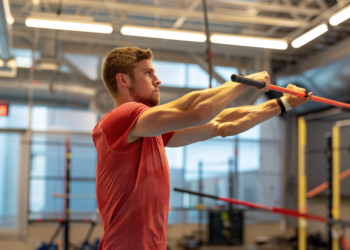You want to perform at your absolute best, pushing your limits and reaching new heights of achievement. Well, guess what? Your nutrition can make or break your performance. Yes, you heard it right – what you eat can have a profound impact on your ability to excel. But fear not, because in this discussion, we will uncover the nutrition strategies that will take your performance to the next level. From pre-workout fueling to post-workout recovery and everything in between, get ready to discover the secrets behind fueling your body for peak performance.
Key Takeaways
- Timing is important for pre-workout fueling and hydration, with a recommended 2-3 hour window before exercise.
- Consuming a combination of carbohydrates and protein within 30 minutes to an hour after a workout helps replenish glycogen stores and stimulate muscle protein synthesis.
- Proper hydration is crucial for optimal performance and cognitive function during workouts.
- Balancing macronutrient intake, including carbohydrates, protein, and healthy fats, supports the body's needs for peak performance and progress towards fitness goals.
Pre-Workout Fueling
Are you looking to optimize your performance during workouts? Fueling your body properly before exercise is key to achieving peak performance. One important aspect of pre-workout fueling is meal timing. The timing of your pre-workout meal can significantly impact your performance. It is generally recommended to eat a meal containing carbohydrates and protein about 2-3 hours before your workout. This allows enough time for digestion and absorption, providing your body with the necessary energy and nutrients for optimal performance.
When it comes to energy sources, carbohydrates are the primary fuel for exercise. They are broken down into glucose, which is then used by your muscles for energy. Including carbohydrates in your pre-workout meal can help replenish glycogen stores and provide a steady source of energy during exercise. Opt for complex carbohydrates such as whole grains, fruits, and vegetables, as they provide sustained energy release.
In addition to carbohydrates, protein is also important for pre-workout fueling. Protein helps repair and build muscle tissue, which can enhance your performance and aid in recovery. Including a source of lean protein in your pre-workout meal is recommended. Examples include chicken, fish, tofu, or Greek yogurt.
Optimal Hydration Techniques
To ensure optimal performance during your workout, it is crucial to implement effective hydration techniques. Proper hydration plays a vital role in maintaining electrolyte balance and supporting cognitive performance. Here are three key techniques to help you stay hydrated and perform at your best:
- Drink water before, during, and after your workout: Start hydrating well before your workout to ensure that you are adequately hydrated. During your workout, aim to drink fluids at regular intervals to replace the fluids lost through sweat. After your workout, continue to drink water to replenish any fluid deficits.
- Consider electrolyte-rich beverages: Electrolytes are essential minerals that help maintain fluid balance in the body. While water is a great choice for hydration, if you are engaged in intense or prolonged exercise, consider consuming electrolyte-rich beverages like sports drinks to replenish electrolyte stores and maintain hydration levels.
- Monitor your urine color: One simple way to gauge your hydration status is by assessing the color of your urine. Aim for a pale, straw-like color, which indicates adequate hydration. Dark urine may indicate dehydration, and you should increase your fluid intake.
Optimal hydration techniques are crucial for peak performance. By staying hydrated and maintaining electrolyte balance, you can support your cognitive performance and ensure that you are performing at your best during your workouts.
Effective Post-Workout Recovery
Implementing effective post-workout recovery strategies is essential for optimizing your performance and ensuring proper muscle repair and growth. After an intense workout, your muscles experience micro-tears, and the recovery process is crucial to promote muscle repair. One key aspect of post-workout recovery is allowing your body ample rest and sleep. During sleep, your body releases growth hormones that aid in repairing damaged tissues, including your muscles. Aim for 7-9 hours of quality sleep each night to support optimal recovery.
In addition to rest and sleep, nutrition plays a vital role in post-workout recovery. Consuming a combination of carbohydrates and protein within 30 minutes to an hour after your workout can help replenish glycogen stores and stimulate muscle protein synthesis. Opt for a snack or meal that includes lean protein sources such as chicken, fish, or tofu, along with complex carbohydrates like whole grains or fruits.
Hydration is also essential for proper recovery. Replenishing fluids lost during exercise helps transport nutrients to your muscles and removes waste products. Aim to drink water throughout the day, and consider adding electrolytes if you engaged in intense or prolonged exercise.
Implementing these post-workout recovery strategies will aid in muscle repair, enhance your performance, and allow you to continue making progress towards your fitness goals. Remember, recovery is just as important as the workout itself.
Balancing Macronutrient Intake
Balancing your macronutrient intake is a critical aspect of optimizing your performance and achieving your fitness goals. It involves ensuring that you consume the right proportions of protein, carbohydrates, and fats to support your body's needs. Here are three key considerations to keep in mind when it comes to balancing your macronutrient intake:
- Choose quality protein sources: Protein is essential for repairing and building muscle tissue, and it plays a vital role in recovery after intense physical activity. Include lean sources of protein such as chicken, fish, tofu, and legumes in your diet. These options provide a good amino acid profile and are low in unhealthy fats.
- Pay attention to carbohydrate timing: Carbohydrates are the primary source of fuel for your muscles, and proper timing of carbohydrate intake can enhance your performance. Aim to consume carbohydrates before and after your workouts to provide your body with the energy it needs. Opt for complex carbohydrates like whole grains, fruits, and vegetables, as they release energy slowly and sustain you throughout your workout.
- Monitor your fat intake: While fats have been given a bad reputation, they are an essential macronutrient that provides energy and helps absorb fat-soluble vitamins. Opt for healthy fats like avocados, nuts, seeds, and olive oil. However, be mindful of portion control, as fats are calorie-dense and can contribute to weight gain if consumed in excess.
Incorporating Nutrient Timing Strategies
In order to optimize your performance and achieve your fitness goals, it is important to incorporate nutrient timing strategies into your nutrition plan. Meal planning plays a crucial role in ensuring that you consume the right nutrients at the right times to support your training and recovery. By strategically timing your meals, you can enhance your energy levels, maximize muscle protein synthesis, and improve overall performance.
To start, consider consuming a balanced meal containing carbohydrates and protein within 1-2 hours before your workout. This will provide you with the necessary fuel to perform at your best. Post-workout, aim to consume a meal or snack within 30-60 minutes to replenish glycogen stores and support muscle recovery. This meal should contain a combination of carbohydrates and protein, such as a protein shake with fruit or a turkey sandwich on whole grain bread.
In addition to meal timing, performance supplements can also play a role in enhancing your nutrient timing strategies. Supplements such as branched-chain amino acids (BCAAs) can be consumed before, during, or after exercise to support muscle protein synthesis and recovery. Similarly, carbohydrate-based supplements, like sports drinks or gels, can be beneficial during prolonged or intense workouts to maintain energy levels.
Incorporating nutrient timing strategies into your nutrition plan can have a significant impact on your overall performance and progress towards your fitness goals. By carefully planning your meals and considering the use of performance supplements, you can optimize your nutrient intake to support optimal performance and recovery.
Frequently Asked Questions
What Are the Best Pre-Workout Fueling Options for Endurance Athletes?
To optimize your performance as an endurance athlete, it's crucial to fuel up with the best pre-workout options. These fueling options should provide you with the necessary energy and nutrients to sustain your endurance workouts.
How Can I Stay Hydrated During Long Training Sessions or Races?
To stay hydrated during long training sessions or races, it's crucial to have effective hydration strategies and understand the importance of electrolytes. Ensuring you drink enough fluids and replenish electrolytes can optimize performance and prevent dehydration.
What Are Some Effective Ways to Recover After an Intense Workout?
After an intense workout, it's important to prioritize post-workout nutrition and rest. Consuming a balanced meal or snack with protein and carbohydrates helps repair and rebuild muscles. Resting allows your body to recover and adapt to the physical stress.
How Do I Determine the Right Balance of Carbohydrates, Fats, and Proteins in My Diet?
To determine the right balance of carbs, fats, and proteins in your diet, start by understanding your body's needs. Consider factors like activity level, goals, and preferences. Experiment and adjust as needed, consulting with a registered dietitian for personalized guidance.
Are There Specific Times During the Day When I Should Focus on Consuming Certain Nutrients for Maximum Performance?
For maximum performance, focus on nutrient timing. Meal timing plays a crucial role in optimizing your performance. Consuming certain nutrients at specific times of the day can enhance your energy levels and support your body's recovery and growth.
Conclusion
In conclusion, implementing proper nutrition strategies is crucial for achieving peak performance. By fueling your body with the right nutrients before and after workouts, staying hydrated, and balancing your macronutrient intake, you can optimize your athletic performance. While some may argue that these strategies require too much time and effort, the benefits they bring to your overall health and performance far outweigh any perceived inconvenience. So, start incorporating these evidence-based and practical tips into your routine and watch your performance soar.













